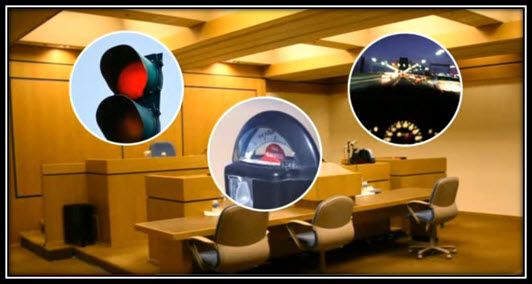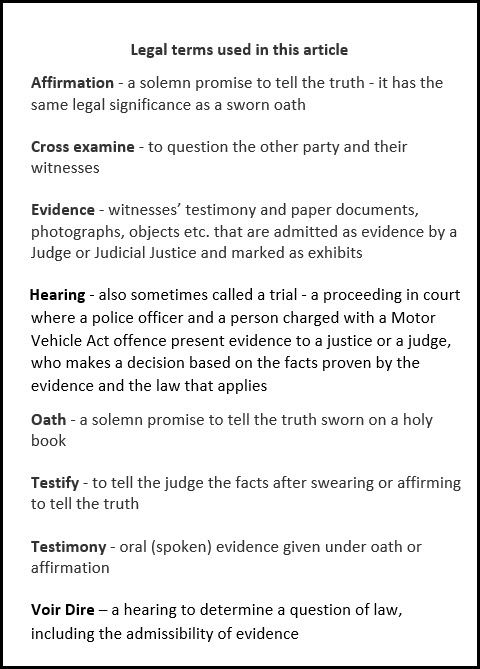Available as a podcast!
You were given a traffic ticket and decided to dispute it, so you filed a Notice of Dispute and received a Notice of Hearing. Now your court date is coming up and you wonder how your hearing will work. Will it be like a trial on ‘Law and Order’, or maybe like those conducted by Judge Judy?
Well, no. This eNews describes how a Traffic Court hearing is likely to work and gives tips on how to conduct your case in court.
This article deals with traffic ticket hearings, but procedure is similar in hearings for offences under municipal by-laws and tickets issued under other provincial and federal statutes, except that the prosecution may be conducted by a lawyer instead of a police officer. The information in the article is taken from the Court’s new Guide to Disputing a Ticket.
When you arrive at the courthouse
Come to court at least 30 minutes early. Allow plenty of time to travel to court and find parking. The police officer who will testify in your case will often be there early and may offer to talk to you. If you did not ask for information about the case from the police officer before the hearing, the police officer can tell you what evidence they have and the witnesses they intend to call to testify during your trial.
Many other hearings will be scheduled at the same time as your hearing. Be prepared to wait, sometimes for up to two to three hours. Cases will generally be dealt with in the order they appear on the court list. However, if a matter is brief, such as a guilty plea or adjournment application, it will be called before the hearings. The hearings may be heard in age order, that is, the oldest matter first.
• Dress comfortably and respectfully - no short shorts, no tank tops, bare midriffs, or bare feet, no hats (except for religious headwear) and no clothing with disrespectful slogans or pictures.
• Do not bring food or drinks into the court room, and do not chew gum in the courtroom.
• Try to get a babysitter; if not, bring someone else to sit with your children during your hearing. If you do bring your children and have no one to help you with them, bring activities to keep them occupied during your hearing so that you won’t be distracted by them.
• Turn your cell phone off for the entire time that you are in the courtroom. If you need your phone during the hearing, ask permission to use it.
How the hearing begins
When your name is called come to the front of the courtroom and stand to the left of the table at the front.
The person who conducts Traffic Court hearings in BC Provincial Court is a judicial justice - the proper way to address them is “Your Worship”. You should stand when you are speaking to the justice or when they are speaking to you.
The justice will read the charge to you and ask for your plea. If you agree that you committed the offence and want to ask for a fine reduction, you plead guilty. If you want to dispute the charge, you plead not guilty.
If you plead guilty
The procedure is the same as if you are found guilty, described below.
If you plead not guilty
If you plead not guilty, the hearing will start.
The justice will explain the procedure to you, and you can ask them questions about anything that you do not understand, but they cannot give you legal advice. To get legal advice, talk to a lawyer well before your hearing. Do not interrupt the justice when they are speaking, as there are certain things they need to explain to you.

The evidence against you
The police officer will present their case first. They will swear an oath to tell the truth or make a solemn affirmation, and then tell the justice about what they saw and why they gave you the ticket. Sometimes, police officers appear by telephone rather than in person. They may also present ("call") additional witnesses to describe what happened.
The reason the police officer goes first is that you are presumed to be innocent and they must prove their case beyond a reasonable doubt. If they provide no evidence or not enough evidence in the hearing, you will be found not guilty.
You have the right to “cross-examine” – to ask questions of the police officer and any witnesses they call after they have finished telling the justice everything they have to say.
A “mini-hearing” about anything you said to the police officer
The police officer may wish to tell the justice what they believe you said at the traffic stop. Because the police officer is a person in authority, the police officer must prove beyond a reasonable doubt that when you spoke to them, you spoke voluntarily.
The officer must convince the justice that they did nothing by word, act or gesture that made you think things would go better for you if you spoke to the officer or things could go worse if you didn’t speak to the officer.
If you do not believe you spoke voluntarily or wish the officer to attempt to prove it, the justice will conduct a mini-hearing to determine if the police officer is able to “prove voluntariness” beyond a reasonable doubt. The legal term for this mini-hearing is “voir dire”. You are entitled to be a witness in the mini-hearing and tell the justice about what you saw and heard the police officer say and do and how that made you feel.
However, if you agree that you spoke voluntarily to the officer no mini-hearing is necessary, and the officer will tell the justice what they believe you said.
If voluntariness is proven, what the police officer states that you said will be part of the evidence for the justice to consider in the hearing on your traffic ticket.
If voluntariness is not proven, the justice will ignore all the testimony in the mini-hearing, including everything the police officer states that you said at the traffic stop.
Your evidence
When the police officer’s case is finished you must decide whether you wish to testify yourself and/or present witnesses.
You do not have to present (“call”) witnesses or be a witness yourself because you are presumed to be innocent. If you do testify or call witnesses, the police officer can question you and try to undermine your case the same way that you were able to question the police officer and their witnesses.
However, being a witness yourself or calling other people as witnesses is the only way the justice can consider your side of the story. You must decide for yourself whether to testify and/or present witnesses.
Witnesses must come to court. The court will not usually consider letters or written statements in the hearing. A subpoena is a court order that requires a person to attend court. You can obtain a subpoena at the Court Registry to compel your witnesses to come to court or provide them with a document to show their employer.
If you want the justice to consider photos, please print them to give to the court. Three copies are ideal, but one copy will do. You should show the photos to the police officer when you question them during their testimony. Ask them questions to identify what the photos show and bring out the evidence they depict.
Summing up
After all the witnesses have been questioned you have the right to summarize the case and point out to the justice the weaknesses in the police officer’s case. The police officer may do this as well about the strength of their case or the weaknesses in your case.
The decision
Usually, the justice will make a decision immediately after you have you have summarized the case. If the police officer has proven the case beyond a reasonable doubt, you will be found guilty. If not, you will be found not guilty.
Penalties
If you are found not guilty that is the end of the matter and no fine or penalty points will be imposed.
If you are found guilty, the justice will then decide on the appropriate penalty. It’s important to know that:
• It is only at this time that the police officer can tell the court about your driving record, if you have one. (Your record can’t be mentioned during the hearing, but it can be used to ask for an increased fine or support a driving prohibition after a finding of guilt.)
• You may ask for a lower fine at this point. For many offences the justice can impose a fine lower than the one shown on your ticket. Explain why the circumstances of the traffic offence and your circumstances justify a lower fine.
• For some offences, the justice cannot reduce the fine below a minimum set by law.
• The justice cannot reduce any penalty points. They are set by regulations.
• The justice may also decide that a prohibition from driving should be imposed. This may happen if you have a significant driving record and/or the facts of the case show that you made very dangerous driving decisions. If losing your driver’s licence would affect your employment you might want to ask the justice to give you time to consult or hire a lawyer to speak for you on this issue.
Ask the justice to explain anything that you don’t understand.
More information
Much of this website’s information on preparing for a criminal trial will apply to traffic and other tickets and by-law hearings as well.
See too How do I dispute a ticket and prepare for a Traffic Court hearing? and Guide to Disputing a Ticket.
Provincial Violation Ticket Forms are available online or at a Provincial Court registry or Services BC office.
BC Motor Vehicle Act
Regulations
Violation Ticket Administration and Fines Regulation

This article provides general information only and should not be used as authority in court proceedings or as a substitute for legal advice.

